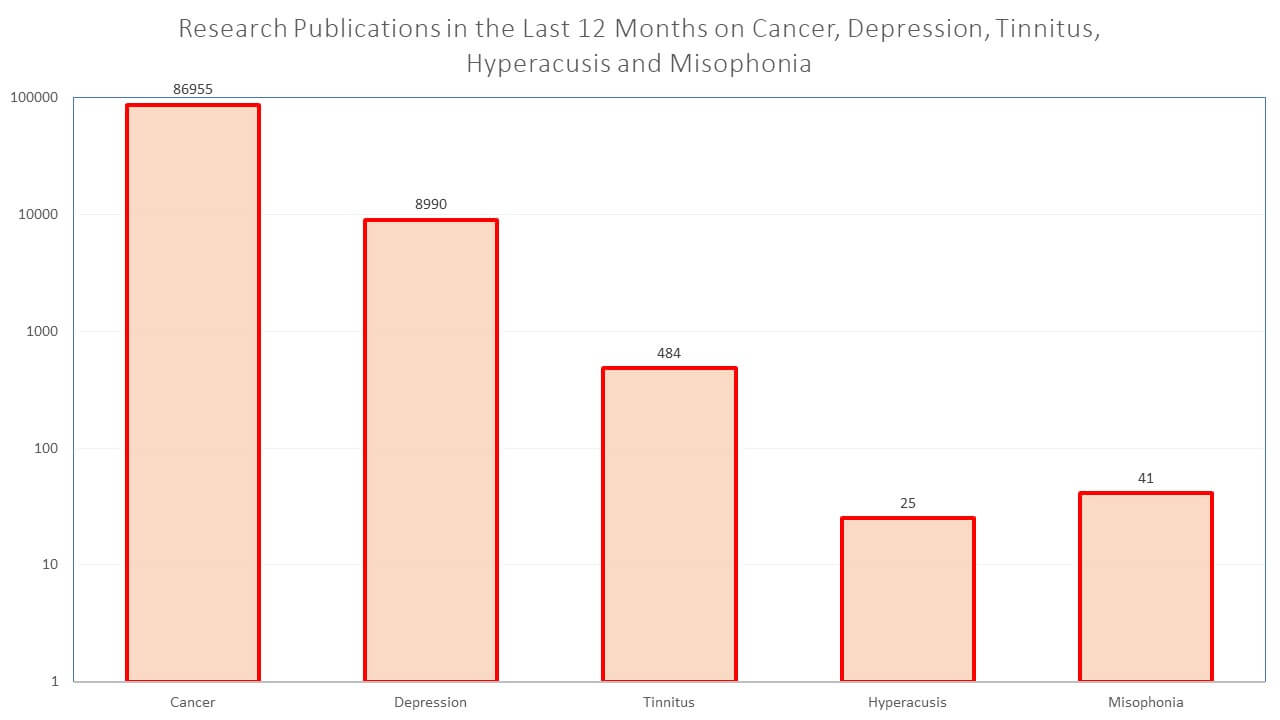Our Research Institute aims to improve diagnostic process and therapy for patients experiencing misophonia, tinnitus and hyperacusis throughout the UK and beyond. We are committed to identifying gaps in research regarding understanding, treating, and preventing misophonia, tinnitus and hyperacusis.
The prevalence’s of tinnitus, hyperacusis, and misophonia are very high (14%, 15%, and 20% of the general population, respectively). Over the past decade, research in our institute in collaboration with scientists and clinicians at universities of London, Oxford, Cambridge, Florida, Buffalo, Melbourne, Helsinki, Nottingham, Regensburg, Antwerp, Tübingen and Surrey and the Royal Surrey NHS Foundation Trust has shown that untreated misophonia, tinnitus and hyperacusis can lead to mental illness, insomnia, and suicidal ideations. Based on our research published in the International Journal of Audiology, Journal of the American Academy of Audiology, American Journal of Audiology and Ear and Hearing, approximately 60% of patients with tinnitus also suffer from sleep disturbances and mental illness and 12% experience self-harm and suicidal ideations. Our recent research presented in the 6th International Conference on Hyperacusis and Misophonia has shown that 100% of people with severe hyperacusis also experience severe mental illness and social isolation. In a study that we published in Frontiers in Neuroscience it was revealed that 81% of patients with severe misophonia also had symptoms of anxiety and depression. These findings are consistent with results reported by other scientists working in centres in the Netherlands, UK, Poland, USA, and Germany.
Despite their high prevalence and their significant impact on the surfers’ lives, the exact causes of misophonia, tinnitus and hyperacusis are not fully understood and there has been very limited research studies conducted so far. The diagram below shows the number of research published in 2022 on conditions such as cancer and depression with well-established research programmes compared to tinnitus, hyperacusis and misophonia. In 2022, over 80,000 studies were published on cancer and about 9000 studies on depression. However, published studies on tinnitus were less than 500 and less than 50 papers were published on hyperacusis and misophonia. This illustrates an urgent need to establish research programmes to investigate these highly prevalent and life changing conditions.

The aim of our research institute is to conduct multidisciplinary experimental and clinical studies to better understand, assess, treat, and prevent misophonia, tinnitus and hyperacusis. Our researchers are working on broad range of topics related to audiology, psychology, pharmacology, genetics and neuroscience. We also offer research training courses, ethical review of the research proposals, research design, research sponsorship, and supervising MSc and PhD students.

Developing and validating psychometric instruments for differential diagnosis and assessment of misophonia, tinnitus and hyperacusis in children and adults. We have developed several questionnaires comprising tinnitus impact questionnaire (TIQ), hyperacusis impact questionnaire (HIQ), misophonia impact questionnaire (MIQ), noise sensitivity impact questionnaire (NIQ), sound sensitivity symptoms severity questionnaire (SSSQ), 4C questionnaires for tinnitus, hyperacusis and misophonia, and the screening for anxiety and depression for tinnitus (SAD-T). These questionnaires have adult’s and children’s versions. We are in the process of validating the English and other languages versions of these questionnaires in collaboration with researchers in Kings College London, Oxford University, Cambridge University, University of Miami, and Freie Universität Berlin.

In this study we are assessing efficacy of a programme of audiologist-delivered CBT comprising 14 therapy sessions (via video calls). This is a specialised therapy for tinnitus, hyperacusis and misophonia rehabilitation and comprises four stages: I) Assessment, II) Preparation, III) Active treatment, and IV) Maintenance stage. The content of the therapy briefly comprises (1) education about tinnitus, hyperacusis and misophonia and relevance of CBT, (2) enhancing patient’s motivation to engage with the therapy process, (3) setting goals, (4) formulation, (5) identifying troublesome thoughts, (6) identifying avoidance behaviours and rituals, (7) SEL (Stop Avoidance, Exposure, & Learn from it), (8) KKIS (Know, Keep on, Identify, Substitute), (9) identify and challenge deeper thoughts and beliefs, and (10) integrating CBT into lifestyle (CBStyle). We are collaborating with University of Surrey in this project.

CBT provided via the internet provides a potential solution to improve access to CBT for tinnitus. The aim of this project is to perform a preliminary assessment of the effect of a specific program of non-guided internet-based CBT for tinnitus, denoted iCBT(T), in alleviating the problems caused by tinnitus alone or tinnitus combined with hyperacusis. In this project we are collaborating with Florida Atlantic University, USA.

The aim of this project is to evaluate differences in tinnitus impact, hyperacusis and hearing threshold level (HTL) between patients with unilateral and bilateral tinnitus. For patients with unilateral tinnitus, to compare audiological variables for the tinnitus ear and the non-tinnitus ear. To assess whether the presence of unilateral tinnitus increases the likelihood of interaural hearing asymmetry (relative to bilateral tinnitus) that warrants referral for an MRI scan. Data regarding HTLs and responses to self-report questionnaires were collected from the records of 311 patients attending our tinnitus clinic. This study is in collaboration with researchers in British Tinnitus Association and University of Pretoria, South Africa.

Exploding Head Syndrome (EHS) is characterised by the individual hearing a sudden loud noise or experiencing a sense of explosion in their head during the transition of sleep-wake or wake-sleep. The experience of EHS shares similarities with tinnitus, where an individual perceives a sound without any external sound source. The possible relationship between EHS and tinnitus has not been explored in the literature. The aim of this project is to assess prevalence of EHS and its related factors among patients seeking help for tinnitus and/or hyperacusis using a retrospective cross sectional study design. We are collaborating with clinicians and researchers in Antwerp University, Belgium and the Royal Surrey NHS Foundation Trust.

In this study we are comparing self-reported ear and hearing symptoms among three groups comprising: (1) confirmed COVID-19 (tested positive), (2) possible COVID-19 (symptoms presented but they did not take any test), and (3) non-COVID-19 in over 1000 participants. We ask participants with confirmed and possible COVID-19 if after their infection (compared to the past) they experienced (1) decreased hearing, (2) ringing, buzzing or whistling noises in their ears, (3) fullness or blockage in their ears, (4) loudness of the sounds that are normal to other people bother them more (an indication of hyperacusis), (5) dizziness, giddiness, or imbalance. We are collaborating with Shahid Beheshti University of Medical Sciences for this study.
For more information about our past research click here.